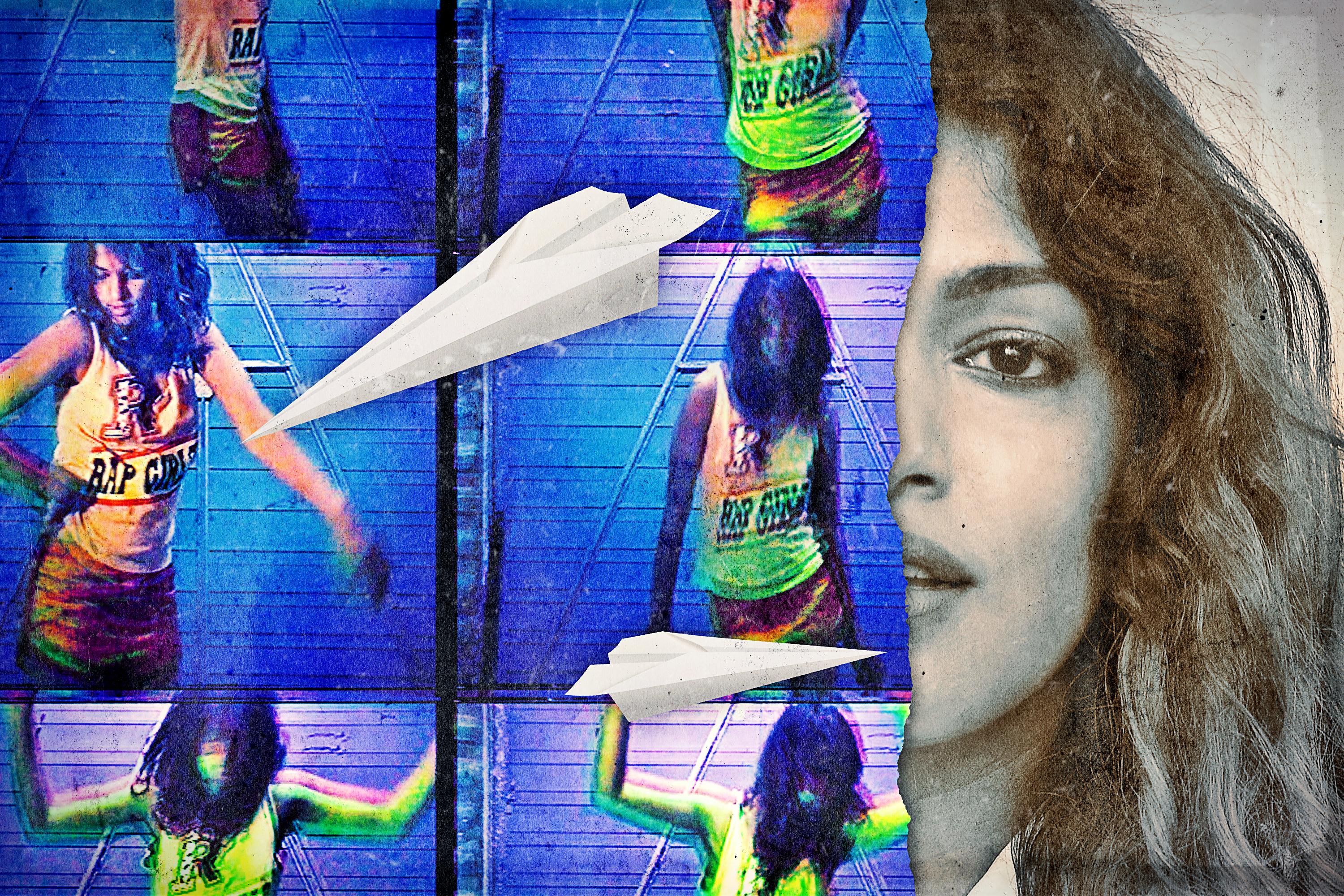Pull Up the People: A New Documentary Makes the Case for M.I.A. As the Pop Star We (Still) Need Right Now
‘Matangi / Maya / M.I.A.’ presents the Sri Lankan–British rapper as a rare and wasted asset: a woman who may have picked some loud and stupid fights, but for far more righteous purposes than messy celebrity entertainers typically offer
In a sense, Matangi / Maya / M.I.A. is a revenge flick: banished rapper M.I.A. storms back into public life, intent to humiliate her many critics, or at the very least correct them, once and for all. Maya Arulpragasam speaks and moves through the documentary with an unprecedented discipline on her part, accounting for a musical stardom that’s proved unwieldy, provocative, and occasionally unwise.
Steve Loveridge directed the documentary, but M.I.A. leads the viewer through her life with overwhelming authority. She provided Loveridge with 900 hours of personal footage, spanning most of her life and dating as far back as her childhood in Jaffna, Sri Lanka, where she lived until moving with her family back to London at age 10 after having left as an infant. The documentary includes old interviews with M.I.A.’s siblings, her parents, her grandmother, plus her earliest friends and musical collaborators, all recorded on home video. In her formative years, Maya shuttles back and forth between her two hometowns, Jaffna and London, the former repelling her once and again with threats of state-sanctioned violence, the latter subjecting her to resentment and indignities from the local skinheads. “I was in Sri Lanka getting shot at for being a Tamil, then I was in England getting shot at for being a Paki,” she says. “The first bit of Western identity I embraced was through music.”
In London, the teenaged Maya records a curious and playful childhood, her headphones pumping her full of punk rock, Britpop, R&B, hip-hop, and grime. Initially, M.I.A. aspires to be a documentarian. Musician Justine Frischmann hires M.I.A. to direct a music video, “Mad Dog God Dam,” for her band Elastica. Frischmann then recruits M.I.A. to travel with the band as a photographer. It’s a tumultuous gig. Personally, Maya grows close to Frischmann, but she comes to resent the supposed frivolity of her band’s music. Tearfully, she records herself articulating her frustrations with the band and Frischmann in particular. “You’ve got access to a microphone and a thousand people every night,” Maya says, “please use it to say something.” Disgruntled, Maya departs London to spend a couple months with her family in Jaffna.
Indeed, Maya’s new Indian passport misidentifies her as a journalist, a designation she fears won’t endear her to the Sri Lanka Armed Forces: “They do shoot journalists,” she says. Ostensibly, she’s just visiting her folks, but here, her home-video footage does reveal journalistic intentions; she’s documenting the civil war from a civilian perspective. “I haven’t seen my family in 16 years,” she says, “and I’m having to spend a lot of time with them off camera.” The civil war has worsened since the Arulpragasam family moved to London.
“You don’t have experience,” her old friend Kolian smirks. Frustrated, M.I.A. recalls the armed harassment she suffered before her family escaped to London. “That’s the only experience that you had,” Kolian answers. “You never had the war-zone experience.” But the home video footage reveals the bleak concerns that dominated her upbringing. Maya’s elusive father, Arular, was an early leader in the militant Tamil resistance movement. “Every Tamil leader today has gone through my school,” Arular says. In Sri Lanka, Arular and his family are haunted by police scrutiny. Arular visits London, and the young Maya gets her dad to talk about smuggling guns, ammo, and explosives, wrapped discreetly in his daughter’s clothes, from Beirut to Jaffna. Arular describes the “national aspiration for which the Tamil people are fighting” as “self-esteem” and “identity.” In the public eye, and all throughout Loveridge’s documentary, M.I.A. struggles with critical interrogations of her identity, her authenticity, and her dramatic identification with her father’s cause.
In London, M.I.A. forges her own identity—and, ultimately, a persona—through nonviolent means. She doesn’t assemble her latest Sri Lanka footage into the documentary feature she initially imagined; but she does begin to incorporate the sights, sounds, and strife of her homeland into a distinct musical outlook. She raps about immigrant culture. She samples chants and drums from unheard corners of the world. She dances. At age 28, Maya becomes M.I.A., a bopping provocateur who presents war documentaries as upbeat music videos and assembles all manners of black and brown rebellion under a single, throbbing bassline.
She writes her breakout hit, “Galang,” with Frischmann before signing with XL Recordings to record her debut album, Arular—named after her father and styled to evoke her family’s culture and politics, including the militant Tamil Tigers. In her songs, her music videos, and her personal style, she turns her own “exotic” appeal against an unwitting Western audience. There are very few artists who have integrated left-wing critique so seamlessly, and unobjectionably, into hitmaking. Her biggest song, her anthem, “Paper Planes,” is the finest encapsulation of the rapper’s pop ideal—it’s a catchy and ubiquitous chorus, written as a parody of xenophobia, violently at odds with the Western world’s prevailing attitudes about refugees and other immigrants. In the documentary, M.I.A. explains the chorus with pride, reveling in its subversive nature (not to mention its commercial success), even as her record label attendants and her cowriter (and onetime boyfriend) Diplo suggest that the song’s rebellious meaning is secondary, if not entirely beside the point.
Ultimately, M.I.A.’s political design forms the documentary’s core concern. In its present-tense, M.I.A addresses the scrutiny of her political commitments, and her intelligence, and her wokeness, as an open philosophical question. She’s mellowed out. Though she does once again prosecute her feud with the former New York Times Magazine journalist Lynn Hirschberg, who wrote a notoriously humiliating profile of M.I.A. eight years ago, just as she’d begun to fall into commercial decline; the rapper’s own footage shows Hirschberg sucking up to the magazine’s cover star with unqualified flattery behind the scenes. Beyond the rapper’s own, personal footage, Loveridge has plenty of supportive news clips to revisit. Bill Maher mocking her supposedly posh British accent as insufficiently impoverished. Tavis Smiley inviting a Sri Lankan foreign secretary to respond to an earlier M.I.A. appearance littered with unchecked propaganda. Loveridge assembles these slights as a collage, and M.I.A. allows the undertones to speak for her. The viewer watches a middlebrow American vanguard, mostly white, smothering a Tamil refugee with primitive anti-hipster skepticism, rank condescension, and political indifference.
In retrospect, Matangi / Maya / M.I.A. presents M.I.A. as a rare and wasted asset: a woman who may have picked some loud and stupid fights, but for far more righteous purposes than messy celebrity entertainers typically offer. For a cruel decade now, the pop landscape has moved on from M.I.A. It’s our loss—save for Loveridge’s documentary, M.I.A. has forfeited socio-critical concern to her larger contemporary, Kanye West, whose right-wing heel turn has sent a generation of crossover rap fans casting about for a new, left-wing champion.

